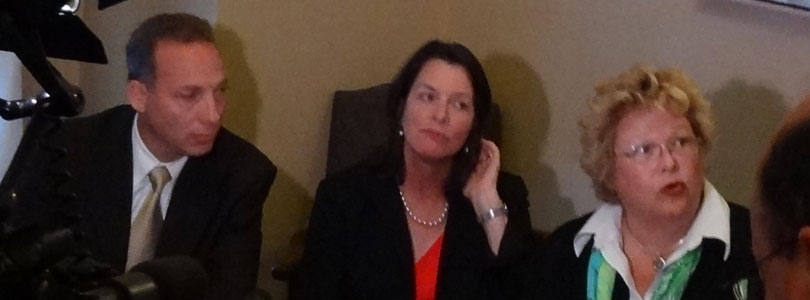Lt. Gov’s Press Conference, Medicaid Expansion, and Small Business Insurance
With the intention of not duplicating coverage of Lieutenant Governor Elizabeth Roberts’s press conference, this morning, with RI Secretary of Health and Human Services Stephen Costantino and new health exchange Director Christine Ferguson, I’d like to focus in on a few points over several posts. For some of the other coverage, see RIPR, WPRI, and the Providence Journal.
The bottom-line upshot from the 45-minute question-and-answer session is that the state expects the various mechanisms of the Patient Protection and Affordable Care Act (PPACA) to bring about 120,000 Rhode Islanders into the health-insurance market, around 80,000 of them subsidized. One of the major mechanisms for doing that is the Medicaid expansion, by which adults, even if childless, will be eligible for Medicaid if their family income is less than 1.33 times the federal poverty level, meaning if single people make less than $14,484 and couples make less than $19,564. Costantino says most of this group will be childless men.
Ted Nesi has found that the Kaiser Family Foundation estimates that 53,841 of the newly insured will be through the Medicaid program. He puts the cost at $1.9 billion over five years, with the state picking up $100 million of it. The Heritage Foundation has found that the Medicaid expansion, specifically, will increase Rhode Island’s Medicaid rolls by 18%, which amounts to a little more than 30,000 people. During the press conference, Costantino put the number at 6,000 to 7,000 childless adults.
According to the Centers for Medicare & Medicaid Services (CMS), the federal government will pick up the full tab for the expansion from 2014 to 2016 and phase that payment down to 90% in 2020, remaining at that rate of funding “permanently.” The Supreme Court’s ruling on this portion of ObamaCare forbade the federal government from removing all Medicaid subsidies from states that choose not to implement this expansion. That may prove important if Congress opts not to fund the provision, which Lt. Gov. Roberts acknowledges as a possibility. Interestingly, she did so with almost the opposite implication: that the state should march forward, because Congress backing out of funding promises is always a possibility.
The majority of Rhode Islanders being drawn into the market, however, are not poor, according to Ferguson. She says 80% of the uninsured are working for small businesses that can’t afford insurance and emphasized that part of the motivation for moving forward with exchanges, for Governor Lincoln Chafee, was affordability for small businesses.
During the press conference, WPRI’s Nesi quoted from a press release in which National Federation of Independent Business Rhode Island Director Bill Vernon states:
“The tragedy in this ruling is that Rhode Island residents are now at the mercy of politicians from other states and bureaucrats in Washington whose decisions won’t be based on what is best for Rhode Island,” said Vernon. “Small businesses here will be overwhelmed by mandates, taxes and burdens imposed on them by people whom we cannot as easily hold accountable.”
Roberts rebutted by arguing that the state will be making “a lot of structural decisions,” especially with regard to the structure of the exchange. A large part of what Vernon is referring to, however, is probably the federal government’s definition of “essentially health benefits.” In addition to ten legislatively listed items, the law empowers the federal Secretary of Health and Human Services to define the benefits, leaving every presidential administration free to adjust the list freely, in accordance with a definition of “the scope of benefits provided under a typical employer plan, as determined by the Secretary.”
Also of concern to small businesses, however, should be the community rating scheme. Under Rhode Island law, small-employer insurers can only vary their rates by age, gender, and family composition with a maximum variation of four times (meaning that the highest premium rate can only be four times the cost of the smallest). Under PPACA (see Section 2701 here), rates in the individual and small group markets can only vary by individual versus family plan (apparently without regard to the number of members), by geographic region, by age, and by tobacco use. Price differentiation by age cannot exceed three times; tobacco use differentiation cannot exceed 1.5 times.
In short, the variation in pricing that Rhode Island insurers can offer to small businesses will be significantly narrower. The likely effect will in essence be that the small businesses drawn into the market will be those whose rates would have been on the higher end but have been lowered at the expense of those at the lower end, to keep the plans within the allowed margins.
Also of interest is ObamaCare’s “special rule for large group market.” Basically, if the state opens the exchange up to this sort of plan, community rating will apply to them, as well, which would be an entirely new development.


